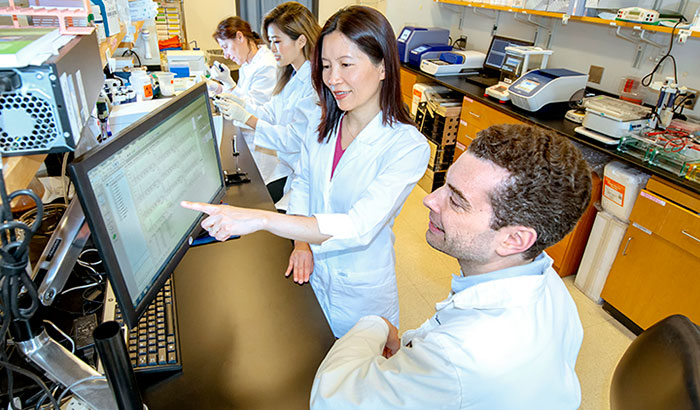Using an innovative protein-based approach, researchers at the Atlanta VA Medical Center and nearby Emory University have found genes and corresponding proteins that could point the way to new depression treatments.
Using a proteome-wide association study (PWAS) that integrated genome-wide association study (GWAS) data with human brain proteomic and genetic data, researchers have identified 19 genes that may lead to depression by altering brain protein levels. They also pinpointed 25 such proteins that offer promise as potential targets for new depression treatments.
The researchers detail their approach and findings in April 2021 in the journal Nature Neuroscience.
Identifying brain proteins that cause depression
Depression is a common condition, but current treatments are ineffective for many people with the mental illness. This research sets the stage for finding new drugs to treat the illness by identifying important gene-protein pairs that likely contribute to the cause of depression and could serve as promising targets for future studies, according to lead researcher Dr. Aliza Wingo, a psychiatrist at the Atlanta VA. She’s also an associate professor at Emory University.
Wingo works with Dr. Thomas Wingo, the first author of the study, at their joint laboratory at the Atlanta VA hospital and Emory. The lab focuses on understanding the genetic basis of brain illnesses. They collaborated on the study with investigators at Emory’s Center of Neurodegenerative Disease.
In seeking new therapies, the research team – with support from VA and the National Institutes of Health – aimed to identify brain proteins that likely cause depression. The team hypothesized that genetic variants influence depression by altering levels of certain brain proteins.
Explaining the risk for depression
Genome-wide association studies played a key role in the research but were not sufficient by themselves, explained Thomas Wingo. GWAS is an important tool for its ability to spot variations associated with medical conditions, including depression, but the genome scans do not shed light on how genetic variations translate into increased disease risk. So the study design combined GWAS and human brain proteomic data toward answering the question, how can variations in brain protein levels explain some of the inherited risk for depression?
By examining proteins – which are the final products of gene expression and the main functional components of cells – PWAS can help elucidate the biological mechanisms underlying depression. The approach can importantly supplement information from GWAS by finding changes in the way a protein is being expressed in a normal gene versus a variant. Despite proteins’ promise as biological informants, and in spite of the fact that proteins make up the bulk of drug targets and biomarkers, this study was conspicuous among depression studies for its direct look at proteins.
Biomarkers for depressive symptoms
It was this rare scientific method – using the “largest and deepest reference human brain proteomes and summary statistics from the latest GWAS of depression,” according to the authors – that allowed the researchers to identify the total of 25 proteins of interest, 20 of which prior GWAS studies did not peg as implicated in depression.
As for the 19 genes they homed in on, the researchers determined they “contribute to depression pathogenesis through modulating their brain protein abundance.” The brain protein fluctuations detected by uniting GWAS and human brain proteomic data are likely among the earlier biological changes in depression and may predispose a person to the illness, said Aliza Wingo, making the findings particularly compelling in terms of therapeutic potential.
`Road leading to new drugs long and difficult’
Follow-up research, including tests in model systems, is crucial to further examine the identified genes’ possible roles in depression and to seek additional implicated genes and proteins, the study authors said. The provocative suggestion that the implicated proteins appear to contribute to the inherited risk of depression has spurred ongoing work at the Wingos’ lab.
“We are very excited to continue to work on these promising targets in our lab but caution that the road leading to new drugs is long and difficult,” said Thomas Wingo, noting another clinical hope based on this area of study: “We take heart that these findings could also prove useful as biomarkers for depressive symptoms. An effective biomarker – like hemoglobin A1C for diabetes – could help with diagnosis and management of depression.”
More Information
Click here to learn more about VA research.
Topics in this story
More Stories
In a new series that highlights advancements in VA health care, VA researchers and clinicians are appearing on a Veteran-themed media platform—Wreaths Across America Radio—to tout their critical work.
Recently published findings from the VA Disrupted Care National Project [...]
Diverse representation of women in health care research allows MVP to make discoveries for women’s health







Can this mean the antidepressants I’ve taken for years may be replaced with another type treatment?